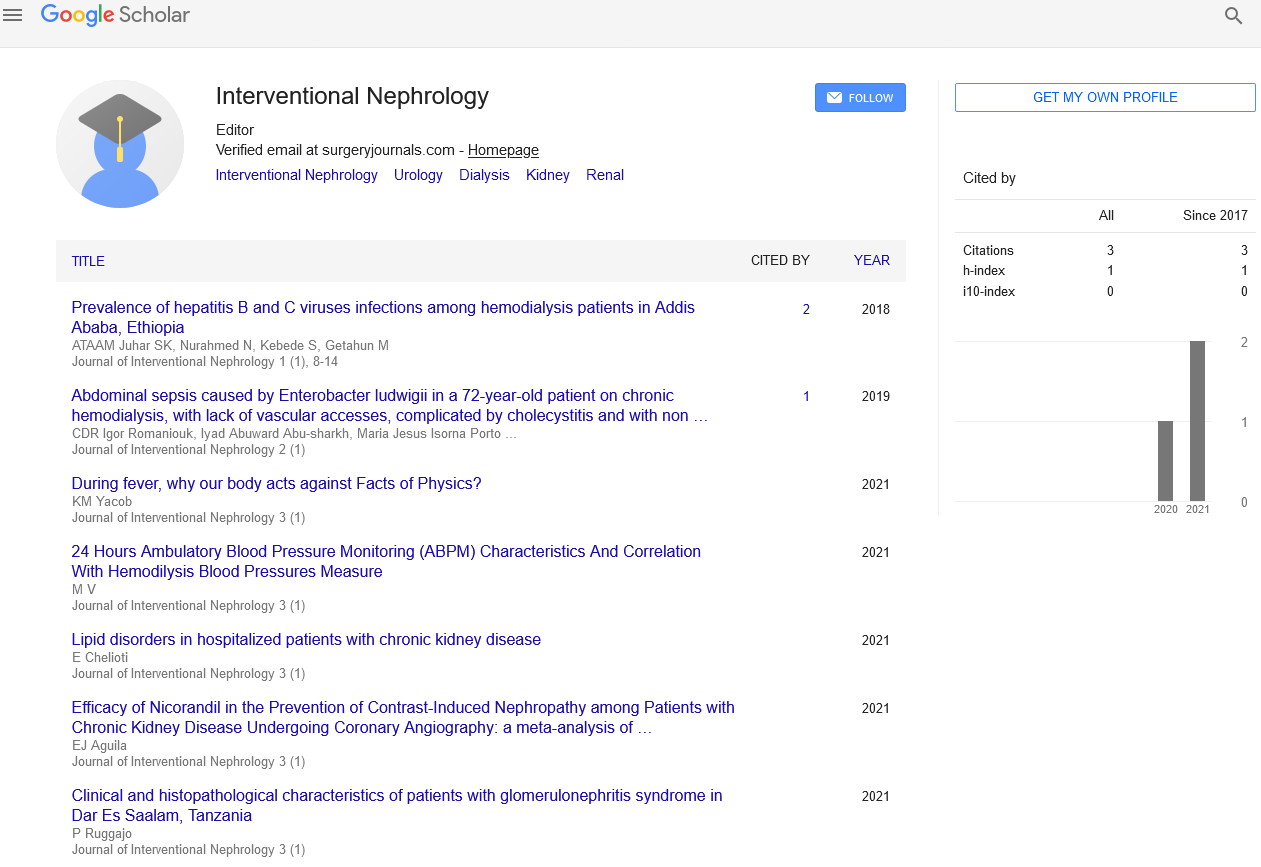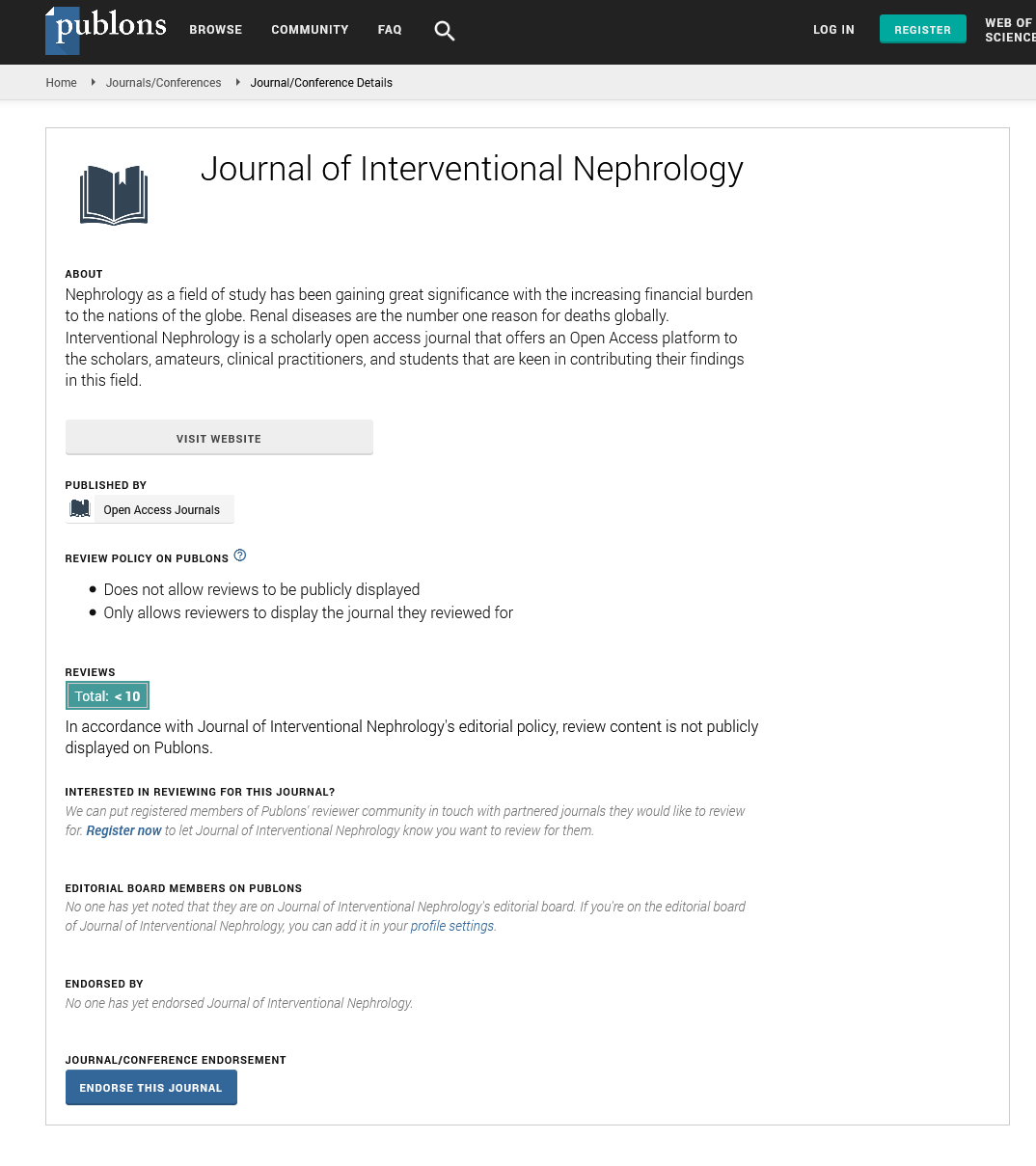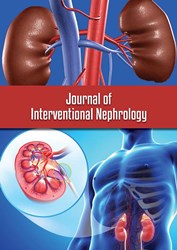Review Article - Journal of Interventional Nephrology (2023) Volume 6, Issue 2
Cancer-Related Kidney Diseases: Understanding the Risks and Treatment Options
Nicola Pisani*
Department of Nephrology/Oncology, Fox Chase Cancer Center, Philadelphia
Department of Nephrology/Oncology, Fox Chase Cancer Center, Philadelphia
E-mail: pisani.nicola@fccc.edu
Received: 01-Apr-2023, Manuscript No. oain-23-96242; Editor assigned: 04-Apr-2023, PreQC No. oain-23- 96242(PQ); Reviewed: 18-Apr-2023, QC No. oain-23-96242; Revised: 21- Apr-2023, Manuscript No. oain-23- 96242(R); Published: 29-Apr-2023; DOI: 10.47532/oain.2023.6(2).35-38
Abstract
Renal disease is a condition that affects the kidneys’ ability to filter waste and excess fluids from the blood. There are several different types of renal disease, including chronic kidney disease, acute kidney injury, and polycystic kidney disease. The causes of renal disease can vary, but hypertension, diabetes, and autoimmune diseases are some of the most common. Symptoms of renal disease may not be noticeable until the disease is advanced, but can include fatigue, nausea, and swelling in the legs and ankles. Treatment for renal disease depends on the underlying cause and the stage of the disease, and may involve lifestyle changes, medications, dialysis, or kidney transplant. Preventing renal disease involves maintaining a healthy lifestyle and managing underlying conditions such as diabetes and high blood pressure. Early detection and treatment of renal disease are crucial for preventing complications and improving outcomes.
Keywords
Kidney disease • Acute kidney injury • Kidney function • Risks and treatment • Cancer-related kidney diseases
Introduction
Cancer is a complex disease that can affect various organs and systems in the body, including the kidneys. Cancer-related kidney diseases are a group of conditions that can occur when cancerous cells invade the kidneys or when cancer treatment causes damage to the kidneys. These conditions can have a significant impact on a patient’s quality of life and require careful management and monitoring by healthcare professionals. Kidney cancer is the most common cancerrelated kidney disease, but other conditions such as nephrotic syndrome, acute kidney injury, and glomerulonephritis can also occur. In this article, we will discuss the risks and treatment options for cancer-related kidney diseases, and emphasize the importance of early detection and prompt treatment for improving outcomes in cancer patients [1].
Cancer-related kidney diseases are a group of conditions that occur when cancerous cells invade the kidneys or when cancer treatment causes damage to the kidneys. These conditions can have a significant impact on a patient’s quality of life and require careful management and monitoring by healthcare professionals. One of the most common cancer-related kidney diseases is kidney cancer, also known as renal cell carcinoma. Kidney cancer is a type of cancer that originates in the cells of the kidneys and can spread to other parts of the body if not treated promptly [2].
Another cancer-related kidney disease is nephrotic syndrome, which can occur as a result of certain types of cancer or cancer treatment. It can be caused by cancerous cells invading the kidneys or by chemotherapy or radiation therapy damaging the kidneys. Chemotherapy and radiation therapy can also cause acute kidney injury, a sudden and severe loss of kidney function that can be lifethreatening if not treated promptly. This condition occurs when the kidneys are damaged by the toxic effects of cancer treatment drugs or radiation therapy. Symptoms of acute kidney injury include decreased urine output, swelling, and confusion. In addition to these conditions, cancer-related kidney diseases can also include glomerulonephritis, a group of conditions that cause inflammation in the kidneys and can be triggered by some types of cancer [3].
Glomerulonephritis can cause kidney damage and can lead to chronic kidney disease if not treated promptly. Managing cancer-related kidney diseases requires close collaboration between oncologists and nephrologists, who specialize in kidney diseases. Treatment options may include surgery to remove cancerous tumors, medications to manage symptoms and complications, and dialysis or kidney transplant in severe cases of kidney damage. It is important for cancer patients to be aware of the potential impact of cancer treatment on their kidneys and to monitor their kidney function closely. Regular blood tests and urine tests can help detect any changes in kidney function early, allowing for prompt treatment and better outcomes [4].
Discussion
Cancer-related kidney diseases can have a significant impact on a patient’s quality of life and require careful management and monitoring by healthcare professionals. These conditions can occur as a result of cancer itself or as a side effect of cancer treatment. The most common cancer-related kidney disease is kidney cancer, which originates in the cells of the kidneys and can spread to other parts of the body if not treated promptly. Kidney cancer is more common in older adults, and risk factors include smoking, obesity, high blood pressure, and a family history of the disease [5].
Nephrotic syndrome is another cancer-related kidney disease that can occur as a result of certain types of cancer or cancer treatment. In this condition, the kidneys leak large amounts of protein into the urine, causing swelling, weight gain, and other symptoms. Chemotherapy and radiation therapy can also cause acute kidney injury, which is a sudden and severe loss of kidney function that can be life-threatening if not treated promptly. Acute kidney injury occurs when the kidneys are damaged by the toxic effects of cancer treatment drugs or radiation therapy. Glomerulonephritis is a group of conditions that cause inflammation in the kidneys and can be triggered by some types of cancer. Glomerulonephritis can cause kidney damage and can lead to chronic kidney disease if not treated promptly [6].
Managing cancer-related kidney diseases requires close collaboration between oncologists and nephrologists, who specialize in kidney diseases. Treatment options may include surgery to remove cancerous tumors, medications to manage symptoms and complications, and dialysis or kidney transplant in severe cases of kidney damage. The choice of treatment will depend on the type and stage of cancer, the extent of kidney damage, and the patient’s overall health. Patients with cancer-related kidney diseases should be aware of the potential impact of cancer treatment on their kidneys and should monitor their kidney function closely. Regular blood tests and urine tests can help detect any changes in kidney function early, allowing for prompt treatment and better outcomes. Patients should also maintain a healthy lifestyle by avoiding smoking, maintaining a healthy weight, and managing any underlying medical conditions such as high blood pressure or diabetes [7].
Cancer-related kidney diseases can be caused by cancer itself or by the treatments used to manage cancer. Kidney cancer is the most common cancer-related kidney disease and accounts for about 3-4% of all cancers. Renal cell carcinoma is the most common type of kidney cancer and is typically treated with surgery, chemotherapy, radiation therapy, or targeted therapy. However, these treatments can cause side effects such as nephrotoxicity, which can lead to acute kidney injury, chronic kidney disease, or even kidney failure. Nephrotic syndrome is a condition that occurs when the kidneys filter too much protein out of the blood and into the urine. This can cause swelling in the legs, feet, and ankles, as well as weight gain, fatigue, and other symptoms. Nephrotic syndrome can occur as a result of certain types of cancer, including Hodgkin’s lymphoma and multiple myeloma. Chemotherapy and radiation therapy can also cause nephrotic syndrome as a side effect. The treatment for nephrotic syndrome depends on the underlying cause and can include medications to reduce inflammation, diuretics to reduce swelling, and blood thinners to prevent blood clots [8].
Acute kidney injury (AKI) is a sudden and severe loss of kidney function that can be caused by cancer treatment. AKI can lead to a build-up of waste products in the body, which can cause nausea, vomiting, and other symptoms. Cancer treatments such as chemotherapy and radiation therapy can damage the kidneys and cause AKI. The risk of AKI can be reduced by using the lowest effective dose of chemotherapy or radiation therapy and by monitoring kidney function closely during treatment. Glomerulonephritis is a group of kidney diseases that can be caused by cancer or other underlying conditions. Glomerulonephritis occurs when the small blood vessels in the kidneys become inflamed and damaged, leading to kidney damage and sometimes kidney failure. Glomerulonephritis can be caused by certain types of cancer, such as lymphoma and leukemia. The treatment for glomerulonephritis depends on the underlying cause and can include medications to reduce inflammation and control high blood pressure [9].
The management of cancer-related kidney diseases requires a multidisciplinary approach involving oncologists, nephrologists, and other healthcare professionals. The treatment plan will depend on the type and stage of cancer, the extent of kidney damage, and the patient’s overall health. Surgery may be necessary to remove cancerous tumors, and medications may be used to manage symptoms and complications. Patients with cancer-related kidney diseases should be aware of the potential impact of cancer treatment on their kidneys and should monitor their kidney function closely. Regular blood tests and urine tests can help detect any changes in kidney function early, allowing for prompt treatment and better outcomes. Patients should also maintain a healthy lifestyle by avoiding smoking, maintaining a healthy weight, and managing any underlying medical conditions such as high blood pressure or diabetes [10].
Conclusion
Cancer-related kidney diseases are a group of conditions that can have a significant impact on a patient’s quality of life. Early detection and prompt treatment are key to managing these conditions and improving outcomes for cancer patients. Healthcare professionals play a critical role in managing these complex conditions, and patients should be proactive in monitoring their kidney function and seeking prompt medical attention if any symptoms arise. With appropriate treatment and management, cancer patients can maintain kidney function and overall health, improving their quality of life during and after cancer treatment. Cancer-related kidney diseases can have a significant impact on a patient’s quality of life. Early detection and prompt treatment are key to managing these conditions and improving outcomes for cancer patients. With appropriate treatment and management, cancer patients can maintain kidney function and overall health, improving their quality of life during and after cancer treatment.
Acknowledgement
None
Conflict of Interest
None
References
- Fagugli P, Patera F, Battistoni S et al. Six-year single-center survey on AKI requiring renal replacement therapy: epidemiology and health care organization aspects. J Nephrol. 28, 339-349 (2015).
- Legrand M, Darmon M, Joannidis M et al. Management of renal replCrossrefacement therapy in ICU patients: an international survey. Intensive Care Med. 39, 101-108 (2013).
- Sankarasubbaiyan S, Janardan JD, Kaur P et al. Outcomes and characteristics of intermittent hemodialysis for acute kidney injury in an intensive care unit. Indian J Nephrol. 23, 30-33 (2013).
- Ricci Z, Ronco C, Amico GD et al. Practice patterns in the management of acute renal failure in the critically ill patient: an international survey. Nephrol Dial Transplant. 21, 690-696 (2006).
- Rosner MH, La Manna G, Ronco C et al. Acute kidney injury in the geriatric population. Contrib Nephrol. 193, 149-160 (2018).
- Yokota LG, Sampaio BM, Rocha E et al. Acute kidney injury in elderly intensive care patients from a developing country: clinical features and outcome. Int J Nephrol Renovasc Dis. 10, 27-33 (2017).
- Ali T, Khan I, Simpson W et al. Incidence and outcomes in acute kidney injury: a comprehensive population-based study. Clin J Am Soc Nephrol. 18, 1292-1298 (2007).
- Navalkele B, Pogue JM, Karino S et al. Risk of acute kidney injury in patients on concomitant vancomycin and piperacillin-tazobactam compared to those on vancomycin and cefepime. Clin Infect Dis. 64, 116-123 (2017).
- Nash K, Hafeez A, Hou S et al. Hospital-acquired renal insufficiency. Am J Kidney Dis. 39, 930-936 (2002).
- Chertow GM, Burdick E, Honour M et al. Acute kidney injury, mortality, length of stay, and costs in hospitalized patients. J Am Soc Nephrol. 16, 3365-3370 (2005).
Google Scholar, Crossref, Indexed at
Google Scholar, Crossref Indexed at
Google Scholar, Crossref, Indexed at
Google Scholar, Crossref, Indexed at
Google Scholar, Crossref, Indexed at
Google Scholar, Crossref, Indexed at
Google Scholar, Crossref, Indexed at


